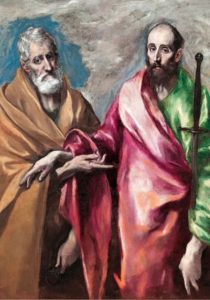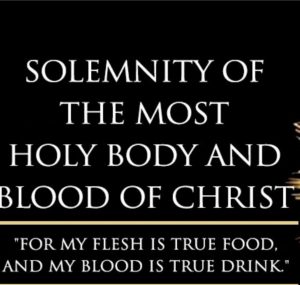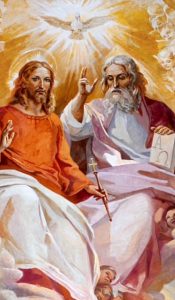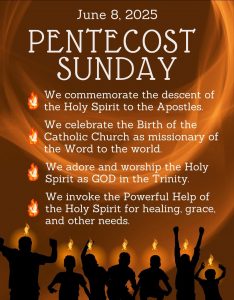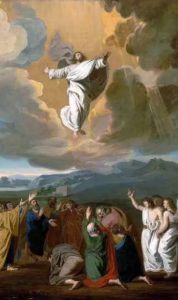Today is the Solemn Feast of these two great Apostles, Peter and Paul. They have changed history by their fidelity to Jesus. St. Peter is the rock, and the keys to the Kingdom of heaven had been given to him by Jesus. He was a leader of the Jewish Christian community in Jerusalem and Antioch and Rome. He was the first Vicar of Christ on earth.
Paul was the staunch follower of the Lord after his conversion. He made history being a missionary for Christ to bring good news to the gentiles in Galatia and Athens and Thessalonica. He contributed to the propagation of Christian faith through his many epistles or letters included in the New Testament.
I am convinced that these two Saints. Peter and Paul, are fittingly called the founding pillars of the Catholic Church despite Peter’s denials and human flaws and Saul, who was a great persecutor of early Christians. Both of them lived in their humanity and their participation in Christ’s Divinity, and they fell on their knees in order to receive redemptive love from Jesus, our Savior. They took upon themselves Christ’s life, death and resurrection, which finally brought them into Christ’s glory.
The 1st reading, from the Acts of the Apostles, narrates the miraculous experience of Peter when he was about to be executed by King Herod because of his preaching about Jesus. While in prison, an angel freed him from his chains. He was told by the angel to get up, get dressed and get out. Peter thought he was dreaming, but once he was out on the street, the angel left him to go and show himself to all those who had been praying for him. This is how Peter was spared from his impending death because the Lord saved him.
In the 2nd reading, a Letter of St. Paul to Timothy, we hear Paul’s writing about his journey in faith after his conversion. He labored much for the propagation of faith, being a convert and being a faithful follower of Jesus Christ. He dedicated his whole life to Jesus, and in the midst of trials and difficulties, he kept the faith while boasting that the Lord stood by him and made him safe for his part in continuing to spread the Goodnews that all are saved by the goodness and mercy of God. He said, “Nothing can separate us from the love of Christ.” (Rom. 8:31-39)
The gospel, taken from the evangelist, St. Matthew, presents signs for proof that Jesus is sent from God as the Messiah. Jesus warns us that there have been clear signs and evidence which validate His claim. Let us focus on this particular gospel pericope which interestingly revealed the very heart of Jesus.
First, Jesus asks, “Who do people say that the Son of Man is?” And Jesus asks His disciples, “Who do you say that I am?” These questions must be taken in the context that Jesus asks His followers about who they think or believe Him to be. The apostles, in particular Peter, attested to the fact that Jesus is more than just a prophet. Peter professes the real presence of the Person of God made man. Jesus is truly the Son of the Living God. I believe that Peter was totally absorbed by the Holy Spirit with whom God worked on him with a change of mind and heart. This is the highlight of the relationship between Jesus and those whom He had called. Jesus clearly is telling us that this act of belief comes, not from physical presentation of evidence, but as a gift from heaven; therefore, faith then is more than examination of evidence. Faith is an ascent of the human will to God.
Second, Jesus said to Simon, “Blessed are you, Simon son of Jonah. For flesh and blood has not revealed this to you but my heavenly Father.” Here, Jesus always breathing profoundly of that same Spirit has in turn bestowed a name change upon Simon. “You are Peter,” Jesus said. It is not only changing his name but informing him that his affirmation that “Jesus is Christ, the Son of the Living God,” is God’s gift. Peter’s reaction on the basis of “flesh and blood” is not about his human capacities but through the revelation from God the Father.
Third, Jesus says, “You are Peter, and upon this rock I will build my Church, and the gates of the netherworld shall not prevail against it.” (Mt. 16:18) Peter was able to become a solid rock, though with human weakness, a stone along the path, a stone on which men can stumble which in Greek language means, “skandalon.” We must be mindful that it was a gift that comes from the Lord and at the same time, a gift to take it with human capacities.
It is a gift of affirmation and ordination that Peter was called the first Vicar of Christ on earth, a person called to take charge of the CHURCH, which is the gathering of people together because they have heard something special being called by Christ, you and me, together defined as the Church.
As Peter, Paul and the other apostles were called, so is all that Jesus gives to Peter meant to continue the calling of Jesus, so that those who hear and follow will be called well. Jesus never imposes anything on us because He is just an inviter. The key given to Peter is not to lock us up but to keep safe the Truths and the Teachings of Jesus for our future with God.
We are in one boat sailing together as Church during this Jubilee of Hope. Let us be mindful of the great, abundant harvests of blessings called to be blest by the Word and Sacraments and to continue to be sent out for further calling and catching for the Lord and not for our self-interest.
Wherever we are, like me being called to another missionary endeavor back in the Philippines after almost 19 years, we preach with authenticity, simplicity of life and actions of love. I believe in preaching the Word of God, no matter how strong the storm, at least by God grace, like Sts. Peter and Paul, who conquered all human frailty, shed their blood and helped the Church to grow.
May our sharing of the cup of suffering of the Lord allow us to stay friends of God.
Fr. Arlon, osa
——————-
El Dictado del Corazón
Solemnidad de San Pedro y San Pablo, Apóstoles, Ciclo C
Lecturas:
- Hechos 12, 1–11
- Salmo 33, 2–3. 4–5. 6–7. 8–9
- 2 Timoteo 4, 6–8. 17–18
- Mateo 16, 13–19
Hoy celebramos la Solemnidad de dos grandes apóstoles: Pedro y Pablo. Ellos cambiaron el curso de la historia mediante su fidelidad a Jesús.
San Pedro es la roca, aquel a quien Jesús confió las llaves del Reino de los Cielos. Fue líder de las comunidades judeocristianas en Jerusalén, Antioquía y Roma, y se convirtió en el primer Vicario de Cristo en la tierra.
San Pablo, después de su conversión dramática, se volvió un ferviente misionero de Cristo. Llevó la Buena Nueva a los gentiles en lugares como Galacia, Atenas y Tesalónica. A través de sus muchas epístolas, que hoy forman parte del Nuevo Testamento, contribuyó enormemente a la expansión de la fe cristiana.
A pesar de la negación de Pedro y del pasado perseguidor de Pablo, ambos vivieron una profunda conversión. En su humanidad, encontraron la divinidad de Cristo. Se arrodillaron para recibir el amor redentor de Jesús, nuestro Salvador. Al abrazar la vida, muerte y resurrección de Cristo, llegaron a participar también de su gloria.
La primera lectura, tomada del libro de los Hechos de los Apóstoles, narra un momento milagroso en la vida de Pedro. Encarcelado por el rey Herodes por predicar a Jesús, Pedro estaba a punto de ser ejecutado. Pero un ángel del Señor se le apareció, rompió sus cadenas y le ordenó que se levantara, se vistiera y saliera. Al principio, Pedro pensaba que era un sueño. Pero cuando se encontró libre en la calle, comprendió que era real. Entonces fue a mostrarse a la comunidad que había estado orando fervientemente por él. El mensaje es claro: el Señor salva.
En la segunda lectura, escuchamos a San Pablo escribiendo a Timoteo al final de su vida. Reflexiona sobre su camino de fe, expresando que ha combatido el buen combate, ha terminado la carrera y ha conservado la fe. A pesar de las pruebas y persecuciones, Pablo nunca dudó. No se gloría en sí mismo, sino en que el Señor estuvo a su lado y le dio fuerza para anunciar la Buena Nueva. Nos recuerda que “nada puede separarnos del amor de Cristo” (cf. Romanos 8, 31–39).
En el Evangelio de hoy, San Mateo presenta un momento clave en el ministerio público de Jesús. Primero pregunta: “¿Quién dice la gente que es el Hijo del Hombre?”, y luego lanza una pregunta más personal: “Y ustedes, ¿quién dicen que soy yo?” Estas preguntas no solo desafían a los discípulos, sino también a cada uno de nosotros.
Pedro, lleno del Espíritu Santo, proclama con valentía: “Tú eres el Mesías, el Hijo de Dios vivo.” Esta profesión de fe marca un punto de inflexión. Pedro habla, no por intuición humana, sino por revelación divina del Padre. Esta es la base de nuestra fe: no solo la razón o la evidencia, sino un don de lo alto. La fe es la adhesión libre de la voluntad humana a Dios.
Jesús responde: “Dichoso tú, Simón, hijo de Jonás, porque esto no te lo ha revelado ningún hombre, sino mi Padre que está en el cielo.” Luego añade: “Tú eres Pedro, y sobre esta piedra edificaré mi Iglesia.”
Aquí, Jesús no solo cambia el nombre de Simón, afirma su nueva identidad y misión. La confesión de Pedro se convierte en el fundamento de la Iglesia, no por su fuerza humana, sino por la iniciativa divina de Dios. Aunque Pedro seguiría luchando con su debilidad, fue, en ocasiones, piedra de tropiezo (del griego skandalon) fue elegido para ser la roca sobre la cual Cristo edificaría su Iglesia.
Jesús entrega a Pedro las llaves del Reino, no para cerrar el paso a los demás, sino para custodiar y preservar la Verdad de la enseñanza de Cristo. Pedro se convierte en el primer pastor del rebaño, llamado a servir, a guiar y a reunir al pueblo de Dios, la Iglesia, que no es un edificio, sino un pueblo convocado por Cristo.
Así como Pedro, Pablo y los demás apóstoles fueron llamados, también nosotros lo somos. Jesús sigue haciendo su invitación a cada uno. Él no impone, invita. Y en este Jubileo de la Esperanza, todos estamos llamados a estar en la misma barca, navegando juntos como Iglesia.
Como Pedro y Pablo, somos enviados a predicar, no por nosotros mismos, sino por el Señor. Donde sea que estemos, ya sea aquí o, como en mi caso, después de casi diecinueve años, de regreso a Filipinas, estamos llamados a predicar con autenticidad, sencillez de vida y actos de amor.
No importa cuán fuerte sea la tormenta; por la gracia de Dios, podemos, como san Pedro y san Pablo, superar nuestra fragilidad humana. Ellos derramaron su sangre, permanecieron fieles, y gracias a su testimonio, la Iglesia ha crecido.
Que al compartir el cáliz del sufrimiento, profundicemos nuestra amistad con Dios, y que las vidas de san Pedro y san Pablo nos sigan inspirando a caminar con humildad y valentía en la fe.
Que Dios los bendiga,
P. Arlon, OSA
